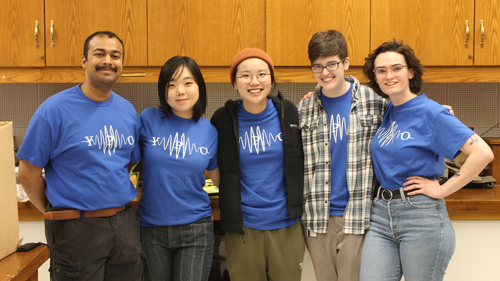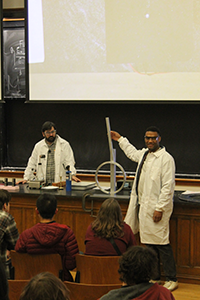
On March 30, 2024, twenty teams of high school students from fifteen different schools from around Connecticut competed in the 24th annual Yale Physics Olympics.
Over the course of the day, teams were challenged with five different events, from constructing a path that a ball must traverse as slowly as possible, to calculating the exact amount of water needed to reflect a laser as precisely as possible onto a target. There was also the traditional Fermi quiz, where contestants had to calculate, as quickly as possible, estimates of various—sometimes serious and sometimes silly—quantities. For example: How many ants are needed to lift an aircraft carrier? Answer: about 109 ants.
Theophilus Human, graduate student in physics and a member of Yale’s Wright Lab, designed “Snell’s Spectacular Specular Sharpshooter Showdown”. The activity had contestants use Snell’s Law to hit a target. The contestants had to calculate the displacement of a red laser beam at some fixed unknown angle utilizing an approximation of Snell’s Law through several mediums; they then had to fill a square vial of water up to the height that they calculated and place this beaker close to where they thought the beam of light would reach the water’s surface. By filling the water height and orienting the vial’s position correctly, total internal reflection would cause the beam to reflect from the surface of the water, exit the vial, and hit a target on the table.
Teams had to not only calculate this beam position from the approximate model, but intuitively understand the limitations of the model and apply appropriate understanding of light’s behavior in a medium to make small adjustments. Due to the curved meniscus of the water in the square vial, any errors from the center were amplified substantially. The team which won the challenge overall (PhOtonic Fource) hit the target with less than a millimeter of error.
Emily Pottebaum and Claire Laffan, also graduate students at Wright Lab, designed “2 Slow 2 Furious”. This activity had groups use the given materials to move a golf ball across a horizontal distance as slowly as possible.
Graduate student Aaron Greenberg, designed the “Somewhat Cool Challenge” event. This activity had students taking an unknown amount of water and melting ice in it to bring the mixture to a certain target temperature.
Greenberg said, “I set out to design an event this year to illustrate a concept from thermodynamics for students, and settled on calorimetry as something I could both make a challenge out of and illustrate the concept. Seeing the students realize the limitations of their materials was very heartening, and many groups were able to do an exceptional job with the challenge. Some teams had the idea of using extra styrofoam cups to help insulate their water from the room’s heat, while others tried to use a mixture of the room temperature water provided and water they mixed to be at zero degrees Celsius. This challenge was a difficult one, but the teams stepped up to the plate and really did a great job with the event and had a ton of fun.”
 After all the events were concluded, the attendees were treated to a physics demonstration show hosted by Eduardo da Silva Neto and Cedric Wilson. At the closing ceremony prizes were awarded to teams, as well as custom medals to overall winning schools. Eight different schools won at least a 3rd prize. “Gibbs us the W” from Morris Hills High School, Rockaway, NJ, won first prize overall, followed by “PhOtonic Fource” from Edwin O. Smith High School, Mansfield, CT, in second (who eked out the second place spot after winning the tie breaker question), and “The Plumb Bobs” from Hopkins School, New Haven, CT, in third. Check out the Yale Physics Olympics website, linked below, for a full list of the winners.
After all the events were concluded, the attendees were treated to a physics demonstration show hosted by Eduardo da Silva Neto and Cedric Wilson. At the closing ceremony prizes were awarded to teams, as well as custom medals to overall winning schools. Eight different schools won at least a 3rd prize. “Gibbs us the W” from Morris Hills High School, Rockaway, NJ, won first prize overall, followed by “PhOtonic Fource” from Edwin O. Smith High School, Mansfield, CT, in second (who eked out the second place spot after winning the tie breaker question), and “The Plumb Bobs” from Hopkins School, New Haven, CT, in third. Check out the Yale Physics Olympics website, linked below, for a full list of the winners.
YPO is an all-day physics competition for Connecticut and surrounding area high school students and teachers, established in 1998 by former Yale Physics professor Con Beausang, and is free for registered teams. Representing their high school or learning institution, students compete in teams of four to complete a pentathlon of a variety physics-themed activities. Different every year, they can involve: measuring an unknown quantity, optimizing a process, or constructing a device to perform a function. One event is always a quiz consisting of Fermi Problems, which require combining clever quantitative guesses to produce a good final estimate of some unknown number.
All images are copyrighted by Sarah Shapiro, Yale undergraduate student, and credit must be given if you use them. See below for the full album.